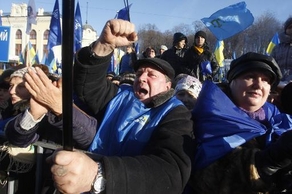Ukraine on Saturday suspended Kiev’s mayor and the deputy head of its security council after a brutal police crackdown last month on a pro-EU opposition protest in the capital.
Ukraine on Saturday suspended Kiev's mayor and the deputy head of its security council after a brutal police crackdown last month on a pro-EU opposition protest in the capital.
President Viktor Yanukovych, who ignited three weeks of demonstrations by rejecting a pact promising closer ties to the EU, announced the move by saying the two officials were suspected of "breaching the constitutional rights of citizens" taking part in the protest.
Baton-wielding riot police roughly dispersed around 1,000 protesters camped out on Kiev's Independence Square in the early hours of November 30, injuring dozens.
The two suspended officials, mayor Olexander Popov and Security Council deputy chief Volodymyr Syvkovych, are being probed on suspicion of pressuring Kiev's police chief "to use violence" against the protesters, Prosecutor General Viktor Pshonka told journalists.
Pshonka said prosecutors would ask the courts to put the mayor, the deputy security council chief and the police chief, Viktor Koryak, under house arrest for overstepping their authority.
The head of the party of jailed opposition leader Yulia Tymoshenko, Arseniy Yatsenyuk, called the suspensions "just the first steps towards punishing all those who were guilty of the illegal beatings," Interfax Ukraine reported.
'We want stability'
Yanukovych supporters earlier Saturday mounted a Kiev rally right next to Europe Square where thousands of anti-Yanukovych demonstrators furious at the president's refusal to sign the Association Agreement with the EU are camped out behind barricades.
Organisers put their number at 200,000, while police estimated 60,000 people attended. Both figures appeared inflated, according to AFP correspondents at the scene, who estimated the number at around 35,000.
The opposition called the rival rally an event staged by Yanukovych's Regions Party, alleging that state employees were brought in under threat of being fired.
Police on Saturday filled the street in the 200 metres (yards) separating the rival demonstrations.
"We came to Kiev to support our president," said 29-year-old Dmytro Khorunzhy, who was bused in with 1,000 others from Kirovograd region to Europe Square. "We want stability.... The (anti-Yanukovych) protests are wrecking the Ukrainian economy."
"Don't divide Ukraine, don't build barricades," Prime Minister Mykola Azarov urged at the pro-government rally.
"The politicians who promote hatred and division of Ukraine don't belong in today's politics. Their place is at the garbage dump," he said.
The Ukrainian president is under intense pressure to decide whether to align his nation with the West by signing a deal with the EU, or to join a Moscow-led Customs Union.
The opposition hopes to stage a record rally Sunday, two days before Yanukovich is to travel to Moscow to meet Russian President Vladimir Putin amid rumours he will agree to join the Customs Union.
On Saturday evening, tens of thousands packed Independence Square as one of the country's most popular rock bands, Okean Elzy, performed in support of the protests.
Singer Svyatoslav Vakarchuk, who was also one of the symbols of the 2004 Orange Revolution, told the crowd: "We dedicate our performance to the guys and young women who suffered from (police) brutality."
West lost 'sense of reality'
Outspoken Republican Senator John McCain flew into Kiev on Saturday and wrote on Twitter that he had "good conversation and dinner" with the three main protest leaders -- the head of the UDAR party Klitschko, nationalist leader Oleg Tyagnybok and Yatsenyuk.
McCain said he also met the powerful Ukrainian Orthodox Patriarch Filaret who has backed the protests and condemned violence.
The United States has made its solidarity with Ukraine's opposition clear, even threatening sanctions after a failed police raid on protesters Wednesday.
Russian Foreign Minister Sergei Lavrov meanwhile accused Western countries of losing "their sense of reality" over Ukraine's crisis and using blackmail to cut the country off from Russia.